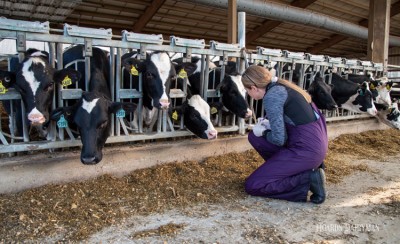To Treat or Not to Treat by Katelyn Allen

By Katelyn Allen, Hoard's Dairyman
Just as in human medicine, antibiotics can serve as a useful treatment tool when a dairy animal becomes sick. Still, just as in human medicine, we must do our best to avoid the overuse of specific antibiotics which could lead to the development of resistant bacteria.
Using antibiotics appropriately on the farm also has implications for keeping residues out of milk and meat. Further, dairy managers must consider the cost of the treatment and if it will provide maximum effectiveness for the animal's condition. All of these factors lead to a question farmers face often: Do I treat or not?
Richard Pereira, an assistant professor at the University of California-Davis School of Veterinary Management, described how to think through this decision during the Golden State Dairy Management Conference.
Diagnosis decisions
First, he stressed the importance of an early diagnosis to maximize the animal's chances of recovery and application of an effective treatment. This requires training and teaching of all employees so they know what symptoms to be aware of.
Perhaps more importantly, though, the diagnosis needs to be accurate. Employees must know how to interpret the symptoms they are witnessing, and again, training is key. Pereira shared the example of teaching nasal discharge scores to calf workers. If everyone understands how to apply this evaluation, earlier and more complete diagnoses can be made.
Once the root of the issue is identified, a manager can decide if nonantibiotic treatment options will work for the condition. Supportive care, such as electrolytes, could be used instead.
If nonantibiotic treatments don't seem to be the best choice, it's still important to consider how effective an antibiotic will be if used, Pereira said. Is it allowed in the class of animals you need to treat? Is it the right choice for the animal's stage of condition?
Treatment that works
After the decision is made to use an antibiotic, Pereira reminded to follow your veterinarian's specific recommendations and adhere to the drug's dosage, treatment route, and duration. This is vital for the antibiotic to be effective, as well as to prevent residues remaining in meat or milk after the stated withdrawal period.
Finally, Pereira advised working with your vet to have a follow-up plan for after the treatment to ensure the condition is cured. Also, include what the next steps might be if the antibiotic doesn't work and the animal requires further care.
Upcoming Events
WNY Pastureland Conversion & Soil Health Field Day
July 16, 2025
Middleport, NY
Join American Farmland Trust for the Western New York Soil Health Field Day on July 16, 2025, at Zeliff Farm in Middleport, NY, from 9:00 AM-3:15 PM. Learn about pasture conversion, soil health benchmarking, biochar in grazing systems, and best grazing practices. Plus, enjoy hands-on demos with the NY Soil Health Trailer, drones, and cover crops! Check out the attached agenda for more information about the field day and REGISTER HERE. Zeliff Farms is a regenerative beef operation who has recently partnered with AFT on outreach and education to farmers including learning circles and evaluating biochar effects on soil health.
IPM Strategies to Protect Corn and Soybean Seed in NY
July 30, 2025
Hamburg , NY
SWNYDLFC and Cornell IPM are hosting a grower meeting to discuss integrated pest management strategies for protecting corn and soybean seed in New York.
FAMACHA Training for Sheep and Goat producers in Woodhull NY
August 13, 2025 : FAMACHA Training in Woodhull
Woodhull, NY
Join us for a discussion and hands-on training for internal parasite integrated pest management in sheep and goats. Certification is available to all students participating in the workshop.
Announcements
No announcements at this time.





